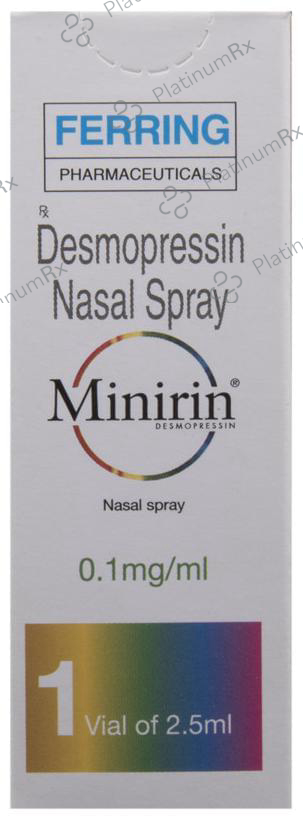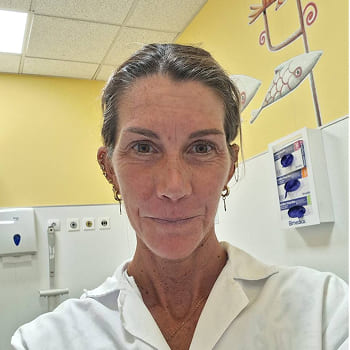

Minirin

Ask a doctor about a prescription for Minirin

How to use Minirin
PATIENT INFORMATION LEAFLET
- 1 -
Enclosed leaflet: information for the user
MINIRIN, 10 micrograms/dose nasal spray, solution
Desmopressin acetate
Read the leaflet carefully before using the medicine, as it contains important information for the patient.
- Keep this leaflet, you may need to read it again.
- In case of any doubts, consult a doctor.
- This medicine has been prescribed specifically for you. Do not pass it on to others. The medicine may harm another person, even if their symptoms are the same.
- If the patient experiences any side effects, including those not listed in this leaflet, they should inform their doctor. See section 4.
Table of contents of the leaflet:
- 1. What Minirin is and what it is used for
- 2. Important information before using Minirin
- 3. How to use Minirin
- 4. Possible side effects
- 5. How to store Minirin
- 6. Contents of the pack and other information
1. What Minirin is and what it is used for
Minirin is an antidiuretic medicine, which reduces urine production. It contains desmopressin, which works similarly to the natural antidiuretic hormone of the pituitary gland - arginine vasopressin.
Minirin nasal spray is used:
to treat central diabetes insipidus,
to test the ability of the kidneys to concentrate urine.
2. Important information before using Minirin
When not to use Minirin
- If the patient has psychogenic or habitual polydipsia (excessive thirst), resulting in a urine production of more than 40 ml/kg body weight per day.
- If the patient has heart failure or other conditions requiring the use of diuretics.
- If the patient has moderate or severe kidney failure with a creatinine clearance of less than 50 ml/min.
- If the patient has hyponatremia, i.e. low sodium levels in the blood. If the patient has the syndrome of inappropriate antidiuretic hormone secretion (SIADH).
- If the patient is allergic to desmopressin or any of the other ingredients of this medicine (listed in section 6).
Warnings and precautions
Warnings
Minirin nasal spray should only be used when oral forms of the medicine are not possible.
Before using Minirin nasal spray, the following should be ensured:
- that fluid intake restrictions are followed,
- 2 -
- that the use of the medicine in children is supervised by an adult controlling the dose taken.
Additionally, regarding the test of the ability of the kidneys to concentrate urine
The test of the ability of the kidneys to concentrate urine in children under 1 year of age should only be performed in a hospital under close medical supervision.
During the test of the ability of the kidneys to concentrate urine, fluid intake should be restricted to a maximum of 0.5 liters from 1 hour before administration to 8 hours after administration.
Precautions
Children, the elderly, and patients with sodium levels in the blood at the lower limit of normal are at greater risk of developing hyponatremia.
To avoid hyponatremia, special precautions should be taken, including careful monitoring of fluid intake and more frequent measurement of sodium levels in the blood, especially when using medicines that can cause the syndrome of inappropriate antidiuretic hormone secretion (SIADH), such as tricyclic antidepressants, selective serotonin reuptake inhibitors, chlorpromazine, carbamazepine, oral hypoglycemic agents of the sulfonylurea group, especially chlorpropamide, and non-steroidal anti-inflammatory drugs.
In case of acute conditions with water and electrolyte disturbances, such as generalized infection, diseases with fever, gastroenteritis, a doctor should be consulted.
There is evidence, obtained after the marketing of this medicine, of cases of severe hyponatremia associated with the use of desmopressin nasal spray for the treatment of central diabetes insipidus.
Children and adolescents
Minirin nasal spray is indicated in children for the treatment of central diabetes insipidus and for the test of the ability of the kidneys to concentrate urine.
Minirin and other medicines
Some medicines may affect the action of Minirin nasal spray. The doctor should be informed of all medicines currently being taken or recently taken by the patient, as well as any medicines planned to be taken. In particular, the doctor should be informed of the use of:
- tricyclic antidepressants,
- selective serotonin reuptake inhibitors,
- chlorpromazine,
- carbamazepine,
- oral hypoglycemic agents of the sulfonylurea group, especially chlorpropamide,
- non-steroidal anti-inflammatory drugs.
The above-mentioned medicines may have an additional antidiuretic effect, increasing the risk of excessive water retention in the body or hyponatremia.
Pregnancy and breastfeeding
If the patient is pregnant or breastfeeding, thinks they may be pregnant, or plans to have a child, they should consult a doctor before using this medicine.
Driving and using machines
Minirin nasal spray has no or negligible influence on the ability to drive and use machines.
Minirin contains benzalkonium chloride
Due to the presence of benzalkonium chloride, this medicine may cause bronchospasm.
- 3 -
3. How to use Minirin
This medicine should always be used as directed by the doctor. In case of doubts, the doctor should be consulted.
Minirin nasal spray should only be used when oral forms of the medicine are not possible
The use of oral forms of the medicine is not possible(see "Warnings and precautions" in section 2 above)
The medicine is administered intranasally (see "Instructions for use" below).
Minirin nasal spray is dosed using a manual applicator. The applicator is designed to deliver 0.1 ml of solution per actuation, which corresponds to 10 micrograms of desmopressin acetate per dose.
Use of Minirin in the treatment of central diabetes insipidus:
The doctor determines the dose individually for each patient. The usual dose for adults is 10 to 20 micrograms (1-2 sprays) 1 to 2 times a day.
Test of the ability of the kidneys to concentrate urine:
The dose for adults is 40 micrograms (4 sprays), for children over 1 year - 20 micrograms (2 sprays), for children under 1 year - 10 micrograms (1 spray).
Urine passed in the first hour after administration of Minirin is excluded from the test. For the next 8 hours, two urine samples should be collected and their osmolality measured.
Instructions for use
Before the first use of Minirin nasal spray, the applicator should be actuated several times until a spray is produced. If the medicine has not been used for a week, it is necessary to actuate the applicator several times again until a spray is produced.
Instructions for use:
Before administration, the nose should be cleaned.
- 1. Remove the protective cap from the applicator.
- 2. Ensure that the tip of the tube inside the bottle is immersed in the solution.
- 3. Actuate the applicator several times if the medicine has not been used in the last week.
- 4. After the spray appears, each subsequent actuation of the applicator delivers one dose of the medicine.
- 5. When inserting the applicator into the nostril, the head should be slightly tilted back.
- 6. If a larger dose is required, the spray should be administered sequentially into each nostril.
- 7. After use, close the applicator with the protective cap and store the bottle in an upright position. The bottle with the medicine should be stored in an upright position.
If there are doubts whether the medicine has been taken correctly and in the right dose, it should not be administered again until the next dose is due.
Administration of the medicine to small children should be done under the close supervision of an adult controlling the dose taken.
Use in children and adolescents
Minirin nasal spray is indicated in children for the treatment of central diabetes insipidus and for the test of the ability of the kidneys to concentrate urine.
Use of a higher dose of Minirin than recommended
Use of a higher dose of the medicine than recommended increases the risk of excessive water retention in the body or decreased sodium levels in the blood, which may or may not be accompanied by symptoms such as headache, nausea, vomiting, weight gain, or, in severe cases, seizures.
In case of use of a higher dose of the medicine than recommended, a doctor should be consulted immediately.
- 4 -
Missing a dose of Minirin
A double dose should not be taken to make up for a missed dose.
4. Possible side effects
Like all medicines, this medicine can cause side effects, although not everybody gets them.
The following very common side effectsaffect more than 1 in 10 people treated with the medicine:
nasal congestion,
rhinitis,
increased body temperature.
The following common side effectsaffect between 1 and 10 in 100 people treated with the medicine:
insomnia,
emotional instability,
nightmares,
nervousness,
aggression,
headache,
nasal bleeding,
upper respiratory tract infection,
gastroenteritis,
nausea,
abdominal pain.
The following uncommon side effectsaffect between 1 and 10 in 1,000 people treated with the medicine:
hyponatremia,
vomiting.
Frequency not known(cannot be estimated from the available data):
allergic reactions,
dehydration,
altered consciousness,
seizures,
coma,
dizziness,
drowsiness,
hypertension,
dyspnea,
diarrhea,
pruritus,
rash,
urticaria,
muscle cramps,
fatigue,
peripheral edema,
chest pain,
chills,
weight gain.
Reporting side effects
If any side effects occur, including those not listed in the leaflet, the doctor should be informed. Side effects can be reported directly to the Department of Monitoring of Adverse Reactions to Medicinal Products of the Office for Registration of Medicinal Products, Medical Devices, and Biocidal Products {current address ,phone and fax number of the Department} e-mail: [email protected] . By reporting side effects, more information can be collected on the safety of the medicine.
5. How to store Minirin
The medicine should be stored out of sight and reach of children.
Store in a temperature below 25°C.
Do not use this medicine after the expiry date stated on the packaging after the words EXP.
The expiry date refers to the last day of the month.
Medicines should not be disposed of via wastewater or household waste. A pharmacist should be consulted on how to dispose of unused medicines. This will help protect the environment.
6. Contents of the pack and other information
What Minirin contains
The active substance of the medicine is desmopressin acetate. 1 ml of solution contains 0.1 mg of desmopressin acetate.
The other ingredients are: sodium chloride, citric acid monohydrate, disodium phosphate dihydrate, benzalkonium chloride (50% solution), purified water.
What Minirin looks like and contents of the pack
Bottle with applicator containing 2.5 ml of solution (25 doses)
Bottle with applicator containing 5 ml of solution (50 doses)
Not all pack sizes may be marketed.
Marketing authorization holder and manufacturer
Marketing authorization holder:
Ferring GmbH
Wittland 11
D-24109 Kiel
Germany
Manufacturer:
Ferring GmbH, Wittland 11, P.O. Box 2145, 24109 Kiel, Germany
For more detailed information, please contact the representative of the marketing authorization holder:
Ferring Pharmaceuticals Poland Sp. z o.o.
Bonifraterska 17
00-203 Warsaw
Phone: + 48 22 246 06 80
Fax: + 48 22 246 06 81
Date of last revision of the leaflet:
- 6 -
- Country of registration
- Active substance
- Prescription requiredYes
- Manufacturer
- ImporterFerring GmbH
- This information is for reference only and does not constitute medical advice. Always consult a licensed doctor before taking any medication. Oladoctor is not responsible for medical decisions based on this content.
- Alternatives to MinirinDosage form: Lyophilizate, 60 mcgActive substance: desmopressinManufacturer: Ferring GmbHPrescription requiredDosage form: Lyophilizate, 120 mcgActive substance: desmopressinManufacturer: Ferring GmbHPrescription requiredDosage form: Lyophilizate, 240 mcgActive substance: desmopressinManufacturer: Ferring GmbHPrescription required
Alternatives to Minirin in other countries
The best alternatives with the same active ingredient and therapeutic effect.
Alternative to Minirin in Spain
Alternative to Minirin in Ukraine
Online doctors for Minirin
Discuss dosage, side effects, interactions, contraindications, and prescription renewal for Minirin – subject to medical assessment and local rules.














